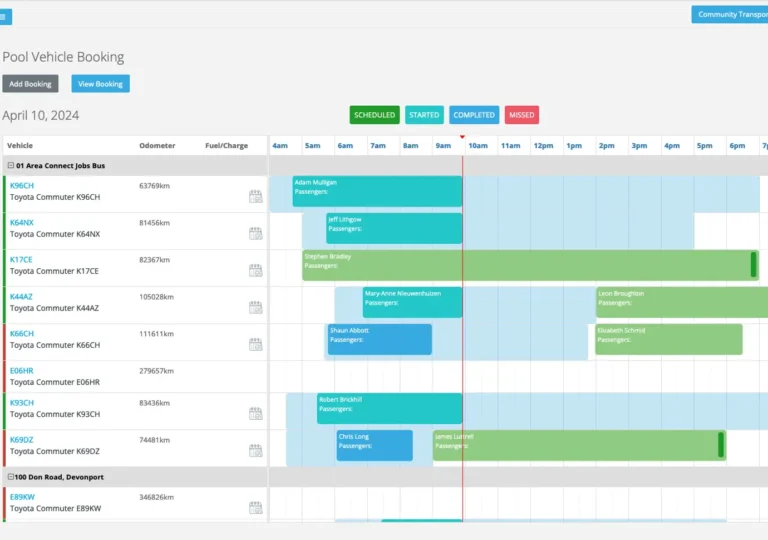Introduction
Managing pool vehicles presents a complex challenge for fleet managers, requiring them to balance availability, maintenance, and cost efficiency.
Fleet managers must ensure that vehicles are adequately maintained and available when needed, which involves scheduling regular service checks and dealing with unexpected repairs.
This task is complicated by the diverse needs of different drivers and departments, making optimal vehicle allocation and scheduling difficult.
Additionally, fleet managers must track usage patterns to optimize the fleet size and composition, which often involves sophisticated software and data analysis.
The goal is to minimize downtime and costs while maximizing efficiency, a task that demands constant attention and strategic planning.
Pool vehicle booking systems increase efficiency
Managing pool cars is often done with Microsoft Outlook, or even pen and paper. Clearly, these “solutions” are sub-optimal as they can lead to mistakes, inaccuracies and legal problems.
Implementing a dedicated vehicle booking system can be transformative for fleet managers overseeing pool cars.
The right tool can:
- enhance visibility into vehicle usage, which allows you to efficiently monitor and analyse how often and for how long each car is used;
- help calibration of fleet size (or as we call it “right-size” your fleet) based on usage;
- ensure each vehicle serves a purpose without sitting idle, which means you’re cutting unnecessary costs;
- prevent scheduling conflicts and guarantees a fair distribution of vehicles among drivers, streamlining operations;
- trigger maintenance alerts based on usage, further minimizing costs related to wear and tear; and
- maximise your lease plan by making sure all cars are used evenly and as required under lease conditions.
If you’re looking for a reliable and efficient method of booking pool vehicles, keep reading. This page will introduce you to Sensium’s pool vehicle booking solution, show you the benefits and give you a demo.
What are pool vehicles?
For many years, companies and government entities have been using “pool vehicles”. In a nutshell, a pool vehicle is a company car that is shared by staff.
Organisations around Australia are moving away from having “company cars” allocated to particular staff members as it saves money and increases efficiency. Some organisations have raised concerns about Fringe Benefits Tax, legal liability and lease implications.
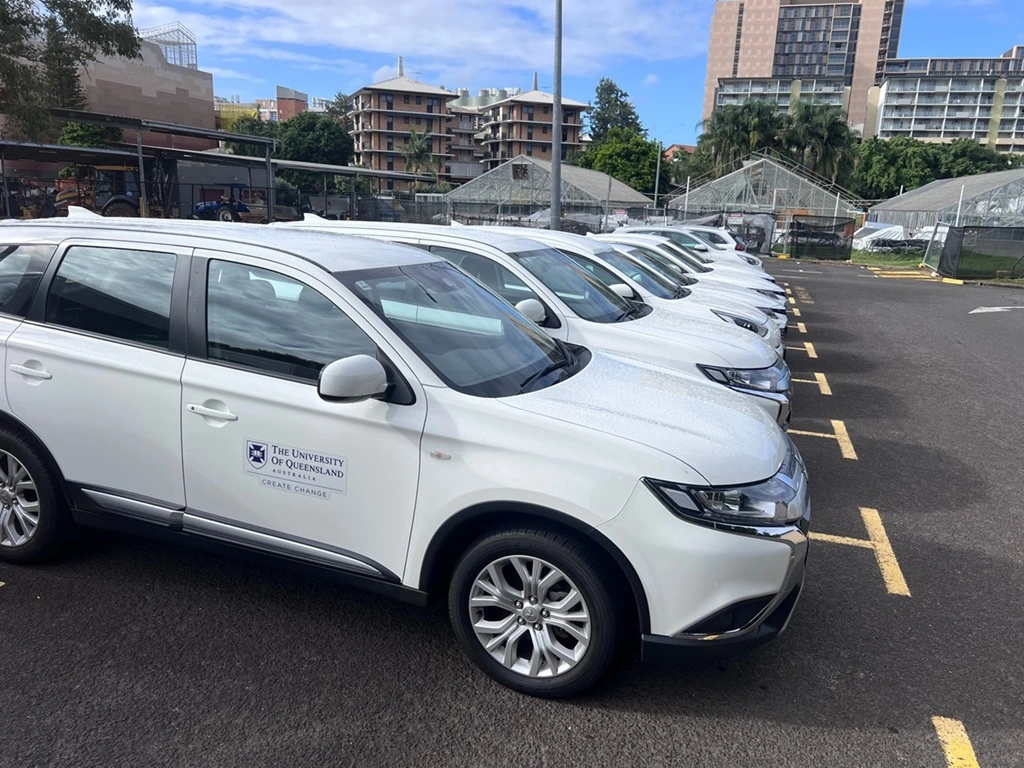
Most Councils in Australia are transitioning away from single-user vehicles into share-car arrangements.
The size of the pool car problem
According to AFMA, 460,000 organisations in Australia have a vehicle fleet, representing 3.7-million vehicles. This alone represents huge challenges managing pool or shared vehicles.
68% of fleet managers in Australia cite increased costs as their greatest challenge in 2024. The ABI 2024 Fleet Technology Trends Report indicates that reducing costs and simplifying process reduces that burden.
Go Auto News reports that cars in Australia have increased in price by an average of 20% since 2020, while CPI rose by just 3.2%.
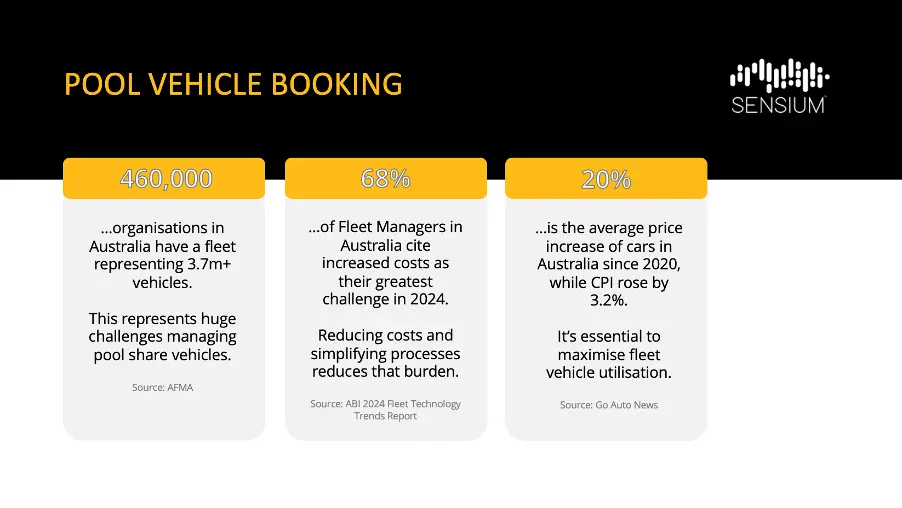
Challenges of pool vehicle booking
Managing pool vehicle bookings presents challenges such as scheduling conflicts, ensuring fair access for all users, and tracking vehicle availability in real-time.
Additionally, fleet managers must handle last-minute cancellations and adjustments, requiring a dynamic and responsive system to maintain efficiency and meet the diverse needs of the organization.
The intricacies of managing pool vehicles bring a range of challenges and costs that can weigh heavily on an organisation.
The administrative burden of booking pool cars can be considerable, incurring additional labour costs and operational complexities. Without dedicated software, managers often struggle with visibility into actual vehicle needs, which can lead to either a surplus or a shortage of cars, disrupting efficiency.
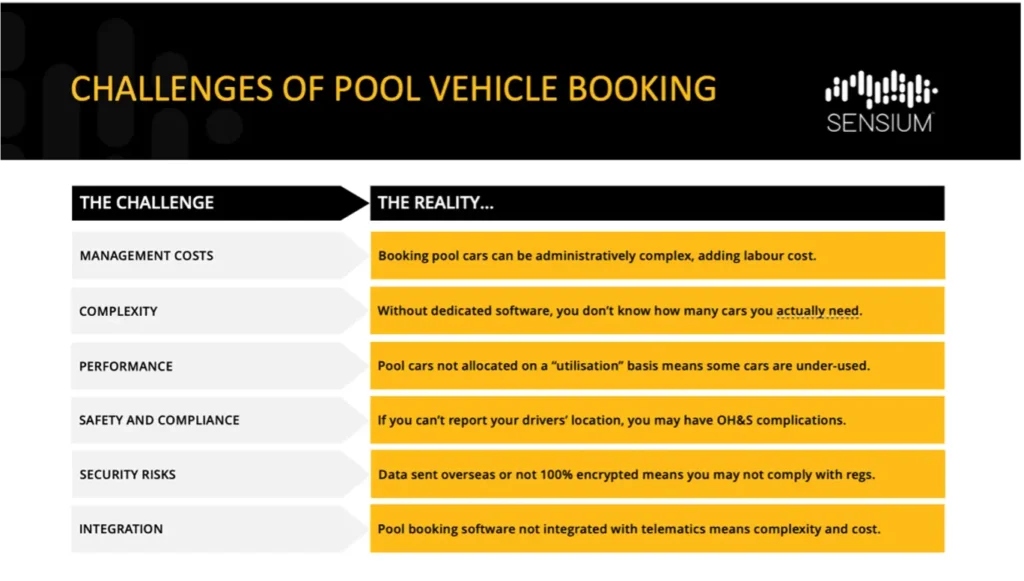
Also, without a system that allocates cars based on utilisation, the fleet cannot perform optimally, leading to some vehicles being underused while others may be stretched thin.
This imbalance not only impacts cost-efficiency but can also affect the overall productivity of the workforce.
The lack of a robust tracking and reporting system raises significant safety and compliance concerns. If managers cannot accurately report their drivers’ locations, they may run into occupational health and safety (OH&S) complications, which can have legal and financial repercussions.
Security risks loom large when data is not fully protected; sending information overseas or failing to ensure 100% encryption can result in non-compliance with regulations, potentially leading to data breaches and legal challenges. Data must remain resident in Australia to meet strict security protocols.
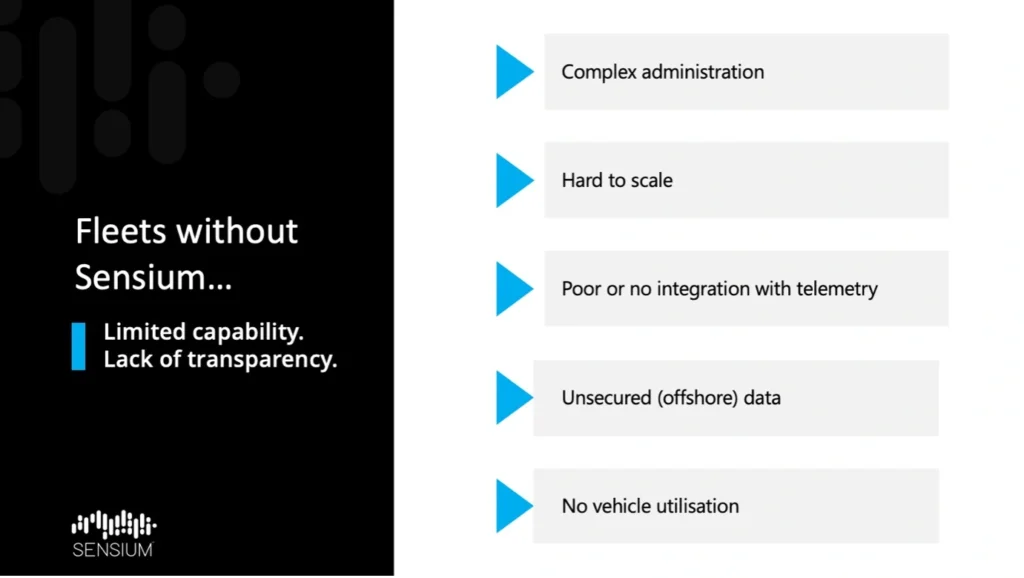
The absence of integration between pool booking software and telematics adds layers of complexity and cost. An integrated system is crucial to streamline operations, enhance security, and improve overall fleet management efficacy.
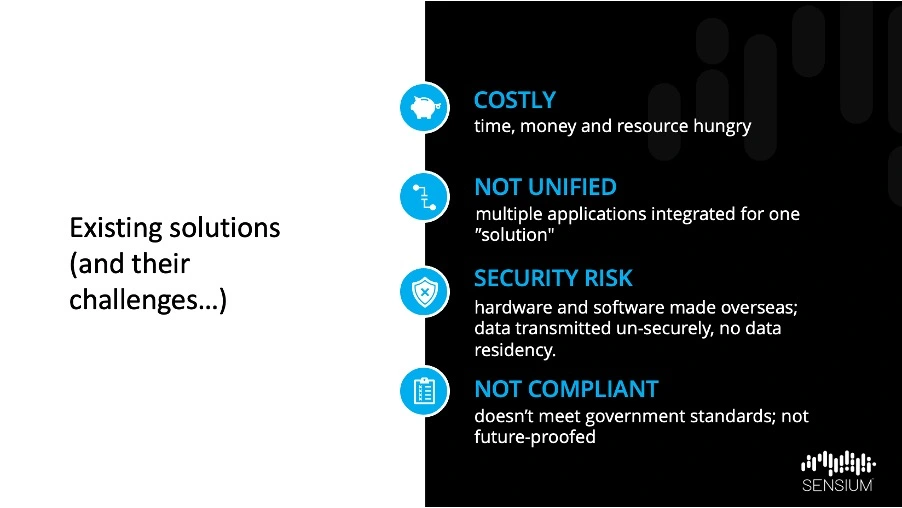
Introducing Sensium’s pool vehicle booking software
Picture this: you’re running a Council fleet with 18 shared vehicles, crisscrossing the Local Government Area, every day. How do you keep track of them all? With Sensium’s pool vehicle booking software, bookings become easier, you can more readily see where your cars are and you save costs by “right-sizing” your fleet.
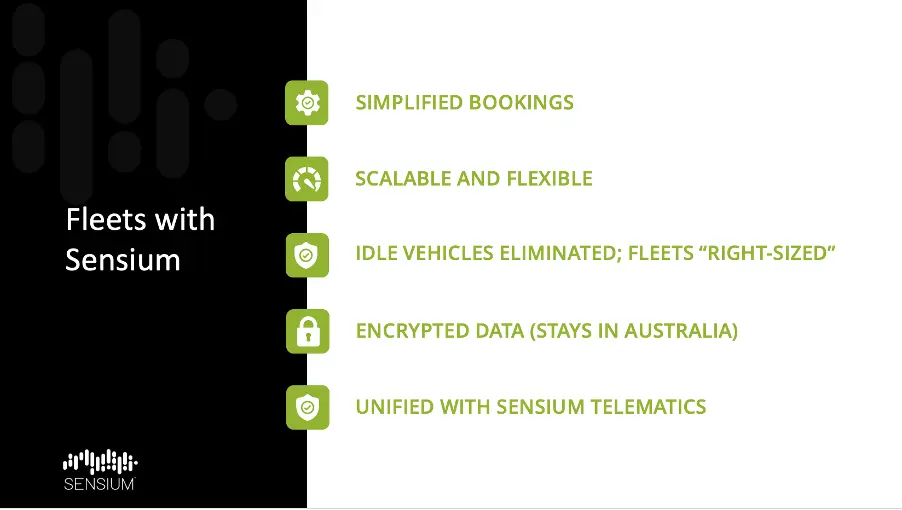
The benefits of using Sensium’s solution to manage shared cars in your fleet
Sensium’s Brisbane-designed pool car management software gives fleet managers peace of mind for having a fleet that is more productive, efficient, secure, and scalable.
Fleets around Australia are using Sensium’s pool vehicle booking solution and are already enjoying reduced expenditure. This is achieved through optimizing fleet size, managing driver schedules more effectively, and controlling maintenance costs to ensure economic use of resources.
The system promotes efficiency by maximising vehicle productivity, and planning a schedule where vehicles are constantly in use rather than sitting idle.
This not only increases the return on investment for each vehicle but also ensures that the fleet is actively contributing to the organisation’s operations without wasted downtime.
Security is a cornerstone of Sensium’s offering. With hardware that is manufactured locally, as well as software that is designed in Brisbane and hosted entirely in Australia, Sensium exceeds security standards, ensuring that fleet data is kept secure and is compliant with stringent Australian data protection regulations. Note, the hardware device brings a lot more features, but it’s optional. We’ll discuss that later.
Importantly, Sensium’s solution is inherently scalable, designed to grow with your business. That means you could start with a trial of, say, 5 cars, and roll it out to more as required, with no loss of efficiency or system lag.
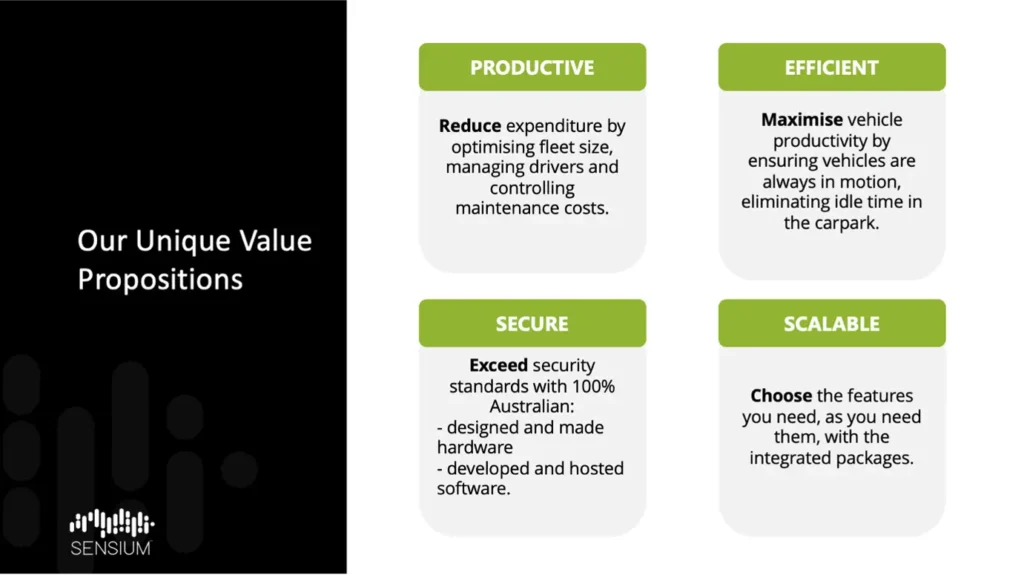
What Sensium focuses on
In the nearly-twenty-years that Sensium has been delivering GPS tracking and telematics, three core themes have been communicated from fleet managers. They’re looking to:
- track and manage vehicles;
- reduce fleet costs; and
- improve driver safety.
While much of Sensium’s key delivery is around telematics, the pool vehicle booking offering is exploding in popularity.
Why Sensium has a hardware device
Sensium’s Australian made TRACKbox is a small device that’s installed into the vehicle’s computer.
The TRACKbox is a telematics device that delivers telemetry. It uses the Telstra 4G network and communicates with Sensium Connect, our software dashboard. This allows the fleet manager to monitor and track the vehicle.
Enhanced Safety
Telematics allows you to keep an eye on driver behaviour and you can arrange to be alerted for things like crashes, harsh braking, heavy acceleration and more.
Increased Efficiency
With telematics you can streamline operations, such like never before. It’s like having a GPS-guided roadmap to efficiency, which keeps all your vehicles running as they should.
Cost Reduction
Whether it’s cutting down on fuel consumption, reducing maintenance costs, or preventing theft, telematics has been proven to reduce fleet costs.
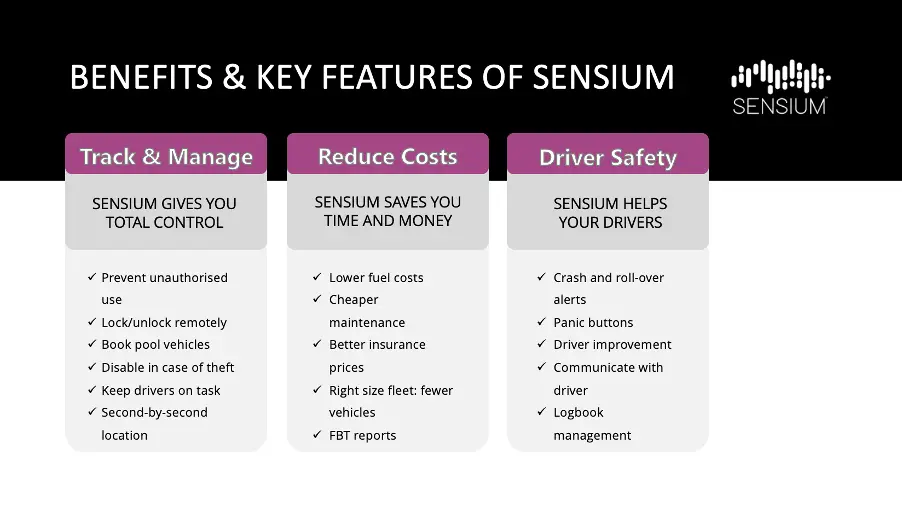
Which pool vehicle booking set-up suits you best?
If you’re looking for a simple way to start managing the loaning of your pool cars, you can start with Sensium’s “app only” version, today.
Sensium’s TRACKbox (the telematics device) is an optional extra that can assist the fleet manager by providing vehicle data, such as car location, knowing the fuel level and the battery health.
You can also choose to add an RFID reader to the set-up, which means staff need to swipe their ID card to access the vehicle. This is really important for organisations that require driver ID for trips and chain of responsibility.
Sensium’s app-only pool vehicle booking
If your staff have access to a phone, you can start using Sensium’s pool vehicle booking system.
While you won’t have access to features such remote lock/unlock or driver ID, the app-only version will allow you to start managing your pool cars easily and quickly.
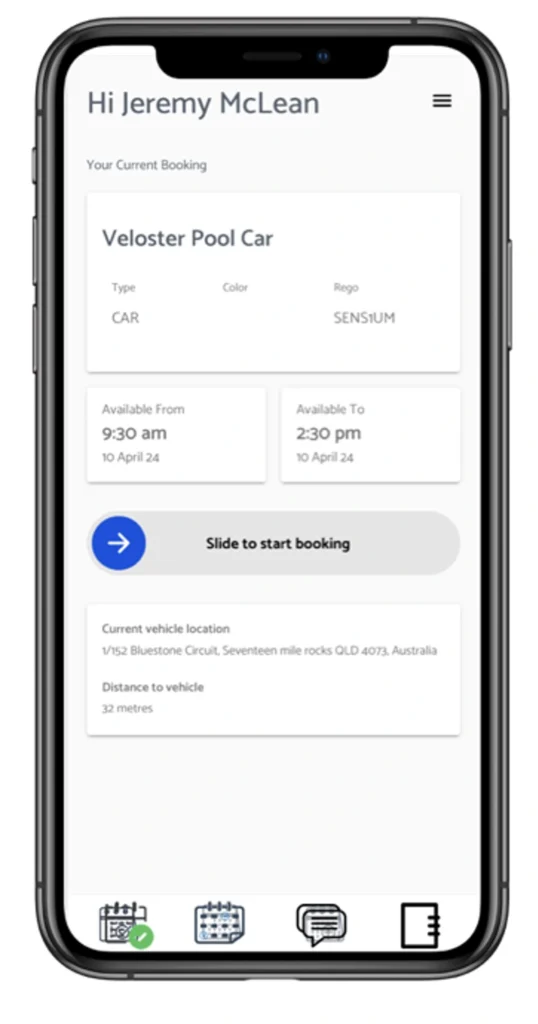
The learning curve for staff is negligible, as the app has been designed to be easy-to-use, which cuts down on tech support and gets people onboard quickly.
The app-only version allows the vehicles to be added as assets, and drivers can be allocated to vehicles.
You can set times for the booking and alerts for when the vehicle booking wasn’t taken up, when it runs late or when the booking is missed.
Contact us for an obligation-free demo.
Sensium’s complete pool vehicle booking system
Additional to the app-only version of the system is the hardware componentry. For organisations that are already using ID cards or security fobs, there’s the ability to physically manage staff access to the vehicles.
With a small card reader device installed under the windscreen, the fleet manager can require staff to “swipe on” and “swipe off” each time they use a car.
For those organisations looking to have driver ID (so you know who’s driving the car each time it’s started) there’s also an option to have a card reader with a buzzer installed inside the car, which has to “swiped” before the buzzer will stop.
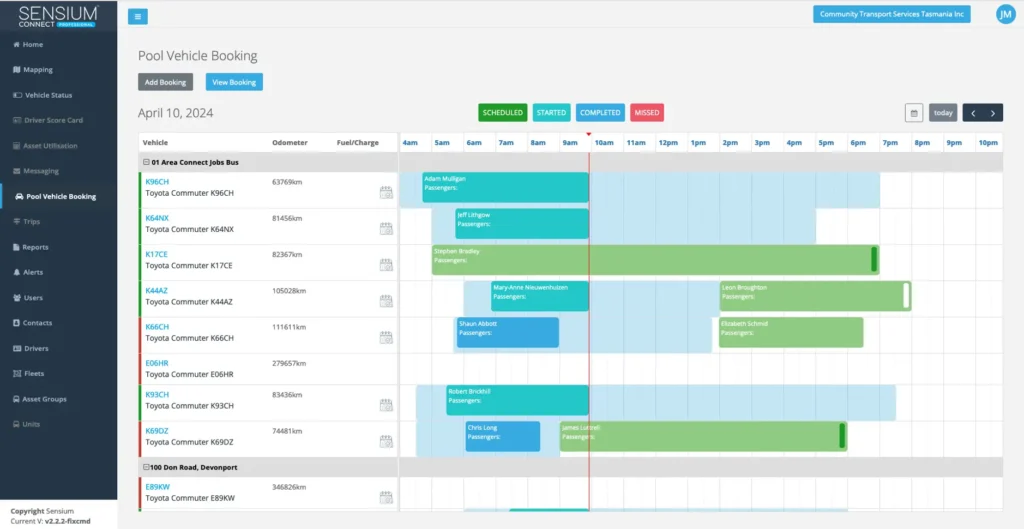
We would be delighted to speak with you, so you can better understand how Sensium pool vehicle booking software might help your organisation.

